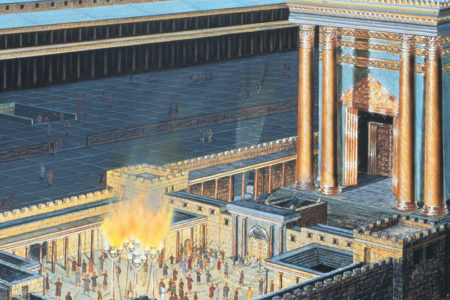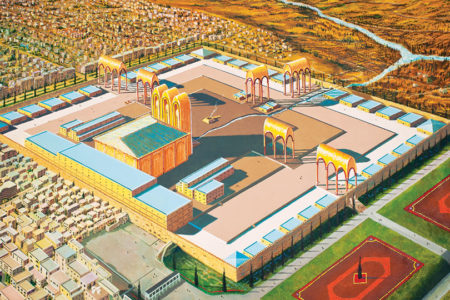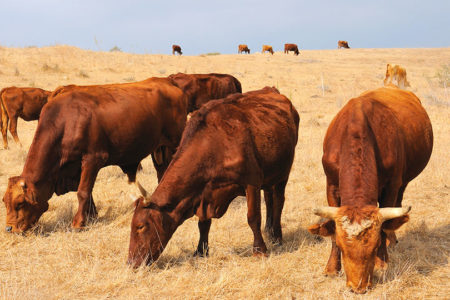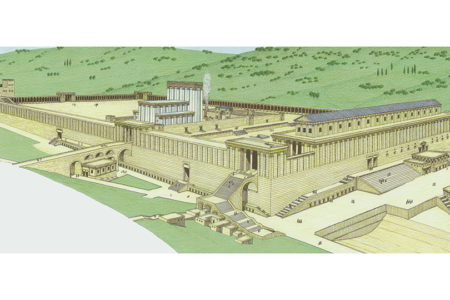Israel: The Nation of Destiny Amos 9
Israel is an enigma to the world. She was miraculously created from the loins of a couple long past the age of childbearing. She was endowed with divine privileges and covenant promises, enabling her to enjoy a spiritual position unparalleled in the annals of human history. During her early history she was protected from neighboring nations bent on her annihilation.
In time, however, tragedy befell Israel. She perverted and prostituted her spiritual privileges, bringing God’s judgment upon her. God turned Israel’s glory into gloom as she suffered national destruction and dispossession of her land and was dispersed worldwide, becoming the tail rather than the head of all nations. She wandered from country to country and was discredited and defamed by most nations.1
Yet this people resisted assimilation and annihilation by the nations to which she was driven. Like the fabled Phoenix, Israel rose from the ashes of destruction and is once again planted in her land, as predicted by the prophets.
In his final message to Israel, Amos picked up his prophetic brush one last time and, in broad strokes, painted this scenario of Israel’s history. He began his message with the theme of his prophecy, alerting Israel to God’s soon-coming judgment.
Revelation to Israel
In his fifth vision, Amos saw the image of a judge, “the Lord standing upon the altar” (v. 1). The word Lord is not the covenant name Jehovah, but Adonai denoting “the God of absolute authority and power to do as He pleases with His people.”2
Where is the altar on which the Lord is standing? Some believe it to be in Solomon’s Temple; thus, the prophet’s message is to both Israel and Judah. Others teach that the altar is in Israel only, most likely the royal altar of Jeroboam. The context of this passage supports the latter view.
The altar was to be a place where God provided mercy by means of a substitutionary sacrifice, but when the altar has been defiled and the sacrifice despised, it becomes a place of judgment from the Lord.3
The Lord is pictured bringing idolatry to judgment. He smote “the capitals of the door, that the posts may shake” (v. 1), causing the Temple roof to collapse, which in turn resulted in the Temple’s destruction. The scene is similar to the time Samson brought destruction to the Philistine temple dedicated to their god Dagon. He did it by pushing down the two center pillars that supported the roof (Jud. 16:23–30).
Amos spoke of an inescapable judgment. Those who were not killed when the Temple collapsed would be cut in the head (decapitated, v. 1) by the invading Assyrian army. None would escape, for the Lord would “slay the last of them” (v. 1).
God’s judgment would be inescapable because He is omniscient and omnipresent. Although some would try to escape by digging into sheol (i.e., the lowest depth possible, v. 2), God would find them. Although some would try to escape to Heaven (i.e., the greatest height possible, v. 2), God would find them. Although they would try to hide in the rugged wooded area of Carmel filled with many caves (v. 3), God would find them. Although they would hide in the bottom of the sea, God would send a serpent (sea monster) to bite (kill) them (v. 3). Although they would be willing to go into captivity (v. 4) like so many docile sheep, hoping to salvage their lives by voluntary submission, even in slavery they would be slain (cp. Lev. 26; Dt. 28).4 Israel would be unable to escape judgment, for God had set His “eyes upon them for evil, and not for good” (v. 4; cp. Dt. 28:63; 2 Chr. 16:9; Ps. 34:15; Jer. 24:6).
The Lord’s judgment was inescapable because He is omnipotent. His finger play brings havoc to the earth. God can touch “the land, and it shall melt, and … rise up wholly like a river” (v. 5). In other words, God can flatten the land by earthquakes, melt the rocks by pouring out burning lava over the land, or bring floods at His will. Such instability in the earth strikes terror in some, causing them to mourn (v. 5), while others are killed by these natural catastrophes, such as those “drowned, as by the river of Egypt” (v. 5).
This great God controls the universe. “It is he who buildeth his chambers [stairs to His throne] in the heavens, and hath founded his troop [vaulted dome, or the arch of heavenly planets] in the earth” (v. 6). He is the one “who calleth for the waters of the sea, and poureth them out upon the face of the earth” (v. 6).
Amos pictured the Lord as a great God who has created and controls Heaven and earth, knits it together, and keeps it functioning with perfect balance. “The one who does all this is not the calf of Bethel, before whom Jeroboam II bowed and sacrificed when he visited the royal altar. On the contrary, ‘The Lᴏʀᴅ is his name’ (v. 6).”5
Retribution to Israel
Israel had been selected by God and given more privileges, promises, and prosperity than any other nation, but this privileged position would not save her from judgment. In fact, God would treat Israel like the Ethiopians (v. 7), a foreign people living in obscurity without God or hope in this world, totally despised by Israel. Such would be God’s attitude toward Israel because of her sin.
Israel had been sovereignly delivered by God out of the land of Egypt (v. 7) into the promised land of Canaan. But this was not unique, for He had brought the “Philistines from Caphtor [possibly Crete], and the Syrians from Kir [somewhere in Mesopotamia]” (v. 7). Although these nations were not as privileged as Israel, God had judged the Philistines (1:6–8) and the Syrians (1:3–5) for their sins. In like manner He would destroy Israel and send her into captivity for rebelling against Him.
Israel had become totally surrendered to sin. Amos informed Israel that “the eyes of the Lord Gᴏᴅ are upon the sinful kingdom,” and He was about to allow the Northern Kingdom to be destroyed “from off the face of the earth” (v. 8). Although God permitted the destruction of Israel when the Assyrians leveled the nation in 722 B.C., He did show them mercy in the midst of judgment, for He promised, “I will not utterly destroy the house of Jacob” (v. 8).
Israel would be sifted because of her sin. The Lord said, “I will command, and I will sift the house of Israel among all nations, as grain is sifted in a sieve; yet shall not the least kernel fall upon the earth” (v. 9). God was about to scatter the Jews worldwide, and they would suffer trials and tribulations during centuries of exile. Grain is sifted to separate it from worthless chaff and other impurities, through this purifying process, God would protect and spare Israel. Israel has been sifted throughout the nations for some 19 centuries as satanically obsessed leaders have attempted to destroy the Jews.
In 135 A.D., the Emperor Hadrian took over Jerusalem and persecuted the Jews. He posted edicts against the practice of Judaism, and any infringement brought the death penalty. Jews were barred from Jerusalem; those trying to enter the city were killed. During the first crusade in 1096, Jews were branded as the enemies, of Christendom, and 12,000 were killed along the Rhine River in Germany. In 1181, King Phillip of France banished the Jews from his country, stripping them of their land and houses. In 1189, at the coronation of Richard the Lionhearted, persecution of the Jews broke out resulting in most Jewish houses in London being burned, people killed, and their possessions claimed by the Crown. In 1348, Jews were blamed for the Black Plague of Europe. Jews were killed in Strausberg (2,000), Maintz (6,000), and Erfut (3,000). In 1478, the Spanish Inquisition broke out, and in 1492, 300,000 Jews were banished from the country and many more killed. In 1520, Jews were banished from Naples, Genoa, and Venice, Italy. In 1794, Jews were restricted in Russia, and Jewish men were forced to serve 25 years in the Russian army. By 1903, renewed restrictions were levied against Jews, and frequent pogroms (massacres) broke out as the Russians destroyed many Jewish villages. The worst holocaust to come upon the Jews took place between 1933 and 1945 when 6,000,000 died at the hands of Hitler’s Germany as he systematically ordered the destruction of European Jewry.
Yet, in spite of all this suffering, the Jewish people have survived persecutions, pogroms, banishment, and systematic genocide—all in fulfillment of Amos’ amazing prophetic forecast.
Amos warned that some Jewish people would be punished because of their rebellious attitudes. “All the sinners of my people shall die by the sword, who say, The evil shall not overtake nor meet us” (v. 10). Amos was saying that those who falsely boasted that judgment would not fall upon the nation (6:1–3, 13) would be purged out by death.
Jeremiah prophesied the survival of Israel in the midst of severe judgment. He said that although God might make a full end of all nations to which He would scatter His people, He would not make a full end of Israel (Jer. 30:11). In fact, He promised that Israel would survive as long as the earth existed (Jer. 31:35–38). What a marvelous promise of God’s grace and mercy in the midst of extreme judgment!
Restoration of Israel
Amid the doom and destruction, a glimmer of hope can be seen: Israel will once again possess her land. Amos prophesied, “In that day will I [God] raise up the tabernacle of David that is fallen” (v. 11). The words in that day had been used to describe Israel’s judgment (2:16; 3:14; 5:18–20; 8:3, 9, 11, 13), but now Amos used these words to proclaim the nation’s restoration, spiritual reunion, and redemption.
The word tabernacle refers to the royal house of David, which the Lord established forever in the Davidic Covenant (2 Sam. 7:11–16). But sin brought the Davidic dynasty to decay and decline, to become only a shadow of its once-great power. With the destruction of Judah in 586 B.C. (Jer. 22:24–30), the rule of the house of David ceased.
When the Messiah returns to set up His Kingdom, the Davidic Kingdom will be reestablished (Ezek. 37:24–25). “In that day [the Lord will] raise up the tabernacle of David that is fallen, and close up the breaches [repair the city wall] of it; and … raise up his ruins [rebuild Israel], and … build it as in the days of old [days of Solomon]” (v. 11).
At that time the boundaries of Israel will be expanded to include all the land promised to Abraham (Gen. 15:18). Israel will possess the remnant of Edom and all the surrounding nations who trust in the Lord (v. 12)., These nations will enjoy the Messiah’s blessing and protection along with Israel. Israel has not known peace with her Gentile neighbors over the centuries, but in that day she will have peace because it will be accomplished by the Lord (v. 12).
This prophecy was quoted by James at the Jerusalem Council (Acts 15:14–17) to show that Gentiles who accepted Christ did not have to undergo circumcision and become Jewish proselytes. In quoting Amos, James proved to the council that Jewish and Gentile believers would exist side by side during the Kingdom age.
Therefore, during the Church age there is no need for Gentiles to become Jews.
During the Kingdom age many changes will take place in the land of Israel and throughout the whole world. First, the land will be very productive as “the plowman shall overtake the reaper, and the treader of grapes him that soweth seed” (v. 13). In that day drought and famine (1:2; 4:6–8) will be replaced with a proliferation of produce. “The mountains shall drop [drip] sweet [new] wine, and all the hills shall melt” (v. 13). The vines will be so loaded with mature grapes that they will drip their juice upon the mountainside while waiting to be harvested. This, in turn, will give the appearance that the mountains are melting.
Second, Jewish people will be brought back from their captivity (v. 14). They will experience an unprecedented peace as they are reinstated in their land and rebuild their destroyed cities (v. 14). Such peace will enable them to plant vineyards and enjoy the fruit of their labors in the Kingdom age (v. 14).
Third, Amos assured Israel that she would be permanently planted in her land, “and they shall no more be pulled up out of their land which I have given them, saith the Lᴏʀᴅ, thy God” (v. 15). This glorious promise made to Israel is a guarantee from the Lord that her possession of the land is to be permanent.
Some in the Church deny that God has promised to reestablish Israel physically in the land of Canaan and fulfill covenant promises made to Abraham and his seed. They believe that the promises to Israel were conditioned on the nation’s obedience to God. They reason that since Israel sinned, breaking her covenant agreement with God, she forfeited any promise of a literal reestablishment in the land of Canaan by the Lord. Those holding this position teach that the Church has taken the place of Israel, and the promises made to the nation are now being fulfilled spiritually in the Church. Thus, the Church is the true Israel of God today, known as spiritual Israel.
This interpretation contains several problem areas. First, those holding this position do not interpret Scripture literally; they spiritualize the text and in so doing give a wrong interpretation to the passages dealing with Kingdom promises to Israel. Second, it is clear from Scripture that the promises to Abraham and his seed were given unconditionally and eternally; they did not depend upon Abraham’s faith or obedience for their fulfillment (Gen. 12:1–3; 15:7–8; 16:6–8). Third, it is never stated in Scripture that the Church has replaced Israel and become spiritual Israel. Fourth, nowhere in the Bible is it said that Israel has forfeited her right to enjoy the promises given in the Abrahamic, Davidic, and New Covenants. In fact, the opposite is true. Over and over again, God gives Israel assurances in the prophetic writings that He will fulfill His covenant promises to the nation.
What an exciting day in which to be living as we witness God beginning to fulfill His promises to Israel! He is breaking the chains of Israel’s captivity as Jews are being gathered from worldwide dispersion, as predicted centuries ago by the prophets of Israel (Dt. 30:3–5; Isa. 11:11–12; Ezek. 36:24; 37:4–14). There is talk that 100,000 Russian Jews will be returning to Israel soon, along with many others from Eastern Europe.
Israel is being raised from the ashes of destruction to fulfill her national destiny! The waste cities are being rebuilt, desolate land is being revitalized, and the vineyards are pouring forth their produce in abundance—a miracle in our time, to be sure!
An unknown poet captured the spirit of Amos’ prophecy in this final chapter when he penned, “Scattered by God’s avenging hand, Afflicted and bemoaned. Sad wanderers from their pleasant land, The Jew has now come home!”
ENDNOTE
- Herbert Lockyer, The Romantic History of Israel (Winona Lake, IN: American Association for Jewish Evangelism Inc.), 4-7, 12.
- Theo Laetsch, The Minor Prophets, Amos (St. Louis, MO: Concordia Publishing House, 1956), 183.
- C. I . Scofield, The New Scofield Reference Bible, Amos (New York, NY: Oxford University Press, 1967), 937.
- Merrill F. Unger, Unger’s Commentary on the Old Testament, Isaiah-Malachi, Vol. II (Chicago, IL: Moody Press, 1981), 1807.
- Gary G. Cohen and Ronald H. Vandermey, Everyman’s Bible Commentary, Hosea/Amos (Chicago, IL: Moody Press, 1981), 164.







